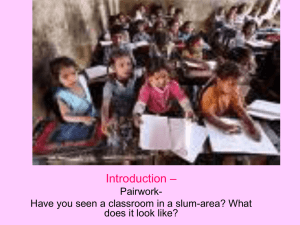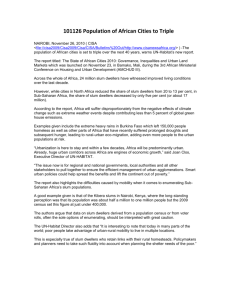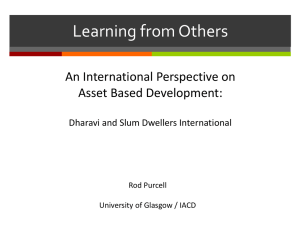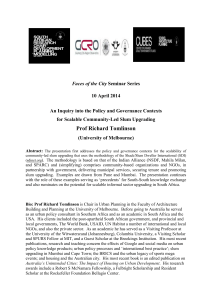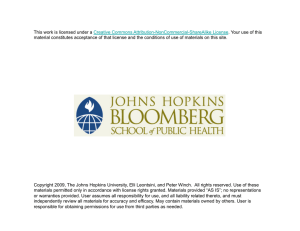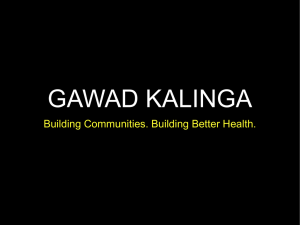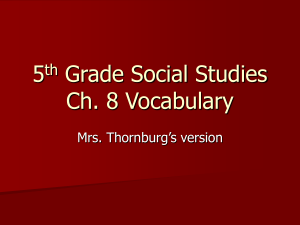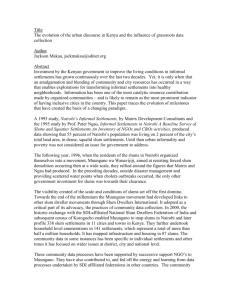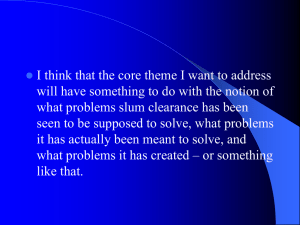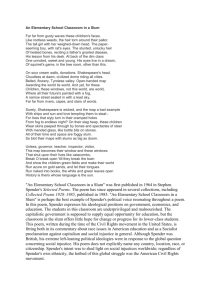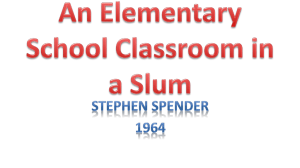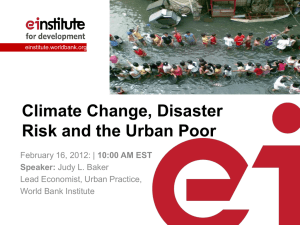Lucy Mathai Responses to Expert queries. How are you thinking
advertisement
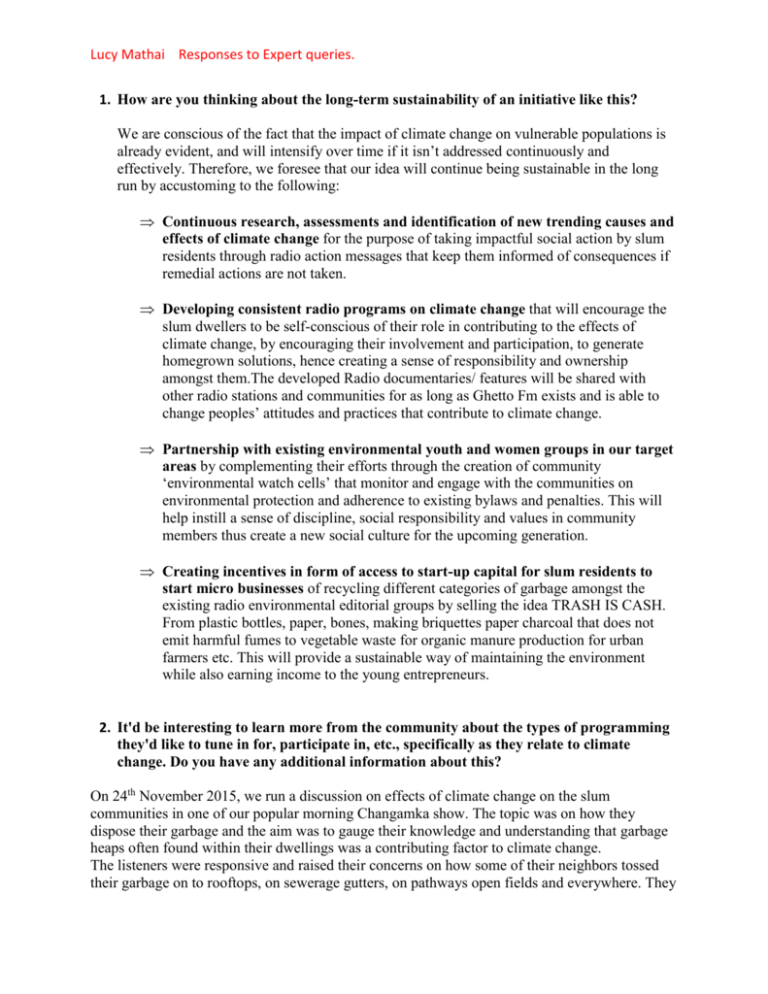
Lucy Mathai Responses to Expert queries. 1. How are you thinking about the long-term sustainability of an initiative like this? We are conscious of the fact that the impact of climate change on vulnerable populations is already evident, and will intensify over time if it isn’t addressed continuously and effectively. Therefore, we foresee that our idea will continue being sustainable in the long run by accustoming to the following: Continuous research, assessments and identification of new trending causes and effects of climate change for the purpose of taking impactful social action by slum residents through radio action messages that keep them informed of consequences if remedial actions are not taken. Developing consistent radio programs on climate change that will encourage the slum dwellers to be self-conscious of their role in contributing to the effects of climate change, by encouraging their involvement and participation, to generate homegrown solutions, hence creating a sense of responsibility and ownership amongst them.The developed Radio documentaries/ features will be shared with other radio stations and communities for as long as Ghetto Fm exists and is able to change peoples’ attitudes and practices that contribute to climate change. Partnership with existing environmental youth and women groups in our target areas by complementing their efforts through the creation of community ‘environmental watch cells’ that monitor and engage with the communities on environmental protection and adherence to existing bylaws and penalties. This will help instill a sense of discipline, social responsibility and values in community members thus create a new social culture for the upcoming generation. Creating incentives in form of access to start-up capital for slum residents to start micro businesses of recycling different categories of garbage amongst the existing radio environmental editorial groups by selling the idea TRASH IS CASH. From plastic bottles, paper, bones, making briquettes paper charcoal that does not emit harmful fumes to vegetable waste for organic manure production for urban farmers etc. This will provide a sustainable way of maintaining the environment while also earning income to the young entrepreneurs. 2. It'd be interesting to learn more from the community about the types of programming they'd like to tune in for, participate in, etc., specifically as they relate to climate change. Do you have any additional information about this? On 24th November 2015, we run a discussion on effects of climate change on the slum communities in one of our popular morning Changamka show. The topic was on how they dispose their garbage and the aim was to gauge their knowledge and understanding that garbage heaps often found within their dwellings was a contributing factor to climate change. The listeners were responsive and raised their concerns on how some of their neighbors tossed their garbage on to rooftops, on sewerage gutters, on pathways open fields and everywhere. They Lucy Mathai Responses to Expert queries. expressed the need to have a proper waste disposal method that encourages individuals to be responsible of their own garbage. The radio moderator created excitement when he decided to talk about creating wealth out of garbage an issue listeners wished to continue discussing. They are eager to have an expert to have a series of radio lessons on how they can turn trash to cash and a series of such a program will keep them tuned in. In our daily late evening’s radio drama, listeners are entertained by characters who were suffering from all sorts of illnesses due to elnino rains that have caused flooding with some residents relocating to higher grounds. One character says that due to his flooded house, he has mastered the language of frogs because his bed has submerged into the water and he is now sharing a bed with them. Feedback from listeners is that they need time for this program to be increased because the radio characters are replaying what many experience every time there is flooding. In slum residents own words, rainy season is their perennial curse as they suffer the following:1 Increased cases of water born diseases e.g. cholera, typhoid, bilharzias etc. 2. Influx of mosquitoes that breed on garbage heaps and cause malaria. 3. Loss of property due to flooding 4. Destruction of shelter by floods 5. Injuries and/or death resulting from electrocution accidents from uninsulated underneath electricity cables. 6. Lack of enough food since suppliers cannot access flooded areas. 7. They suffer power blackouts causing increased insecurity. They also applauded the idea of giving fines to people who litter and construct structures on drainages and sewer systems. Most agreed on the importance of educating slum dwellers on preparedness to curb effects of flooding. From the discussion, we concluded that most of the slum community are conscious of flood risks, and are willing to participate in coming up with solutions, sharing experiences and community-mobilized sustainable drives. Human beings have a tendency of responding favorably to programs that touch on their own protection. As such, they will tune in to radio programs that will either help them make money by learning a new skill, or protect them from illness. 3. Are there other radio programs addressing similar issues? How does what you've proposed differ? Yes indeed there are many commercial radio stations that have climate change related programs. For example, most recently, Kenya faced heavy EL NINO rains and radio and television stations reported flooding experienced in the country attributing it to effects of climate change. As an NGO radio, Ghetto FM has a human centered approach in that besides radio programming; there are also social action programs in health, education and economic empowerment. This means that SIDAREC the NGO implements radio broadcasts on the ground with the affected slum residents through her programs. This makes our radio Lucy Mathai Responses to Expert queries. broadcasts different because, we go a step further to ensure both the local government leaders and the slum community implement action plans as discussed. Being a non-commercial community radio, we focus on addressing social issues affecting the slums where we are also based. It is a walk in walk out radio access where issues are broadcast on short notice and we have no shortage of discussants. Therefore, we do not just report on issues, rather we mobilize and Organize the slum community into oversight groups to ensure that the pledges made by leaders are implemented to their satisfaction. We moderate slum residents and stakeholders discussions aimed at developing lasting solutions through community conversations in focus groups, radio listening groups where they share their own stories, design possible solutions and interact with radio presenters to design radio programs.
